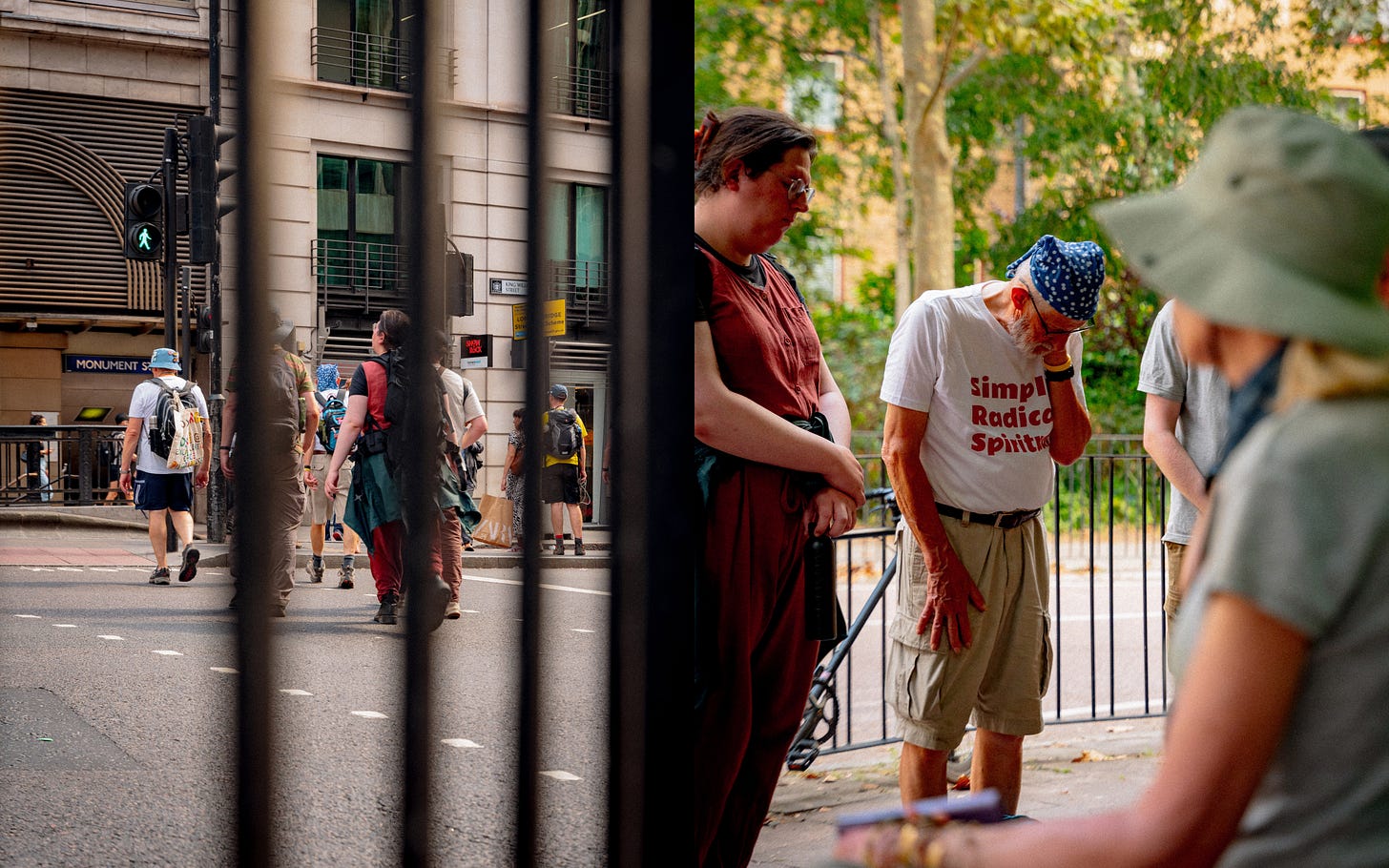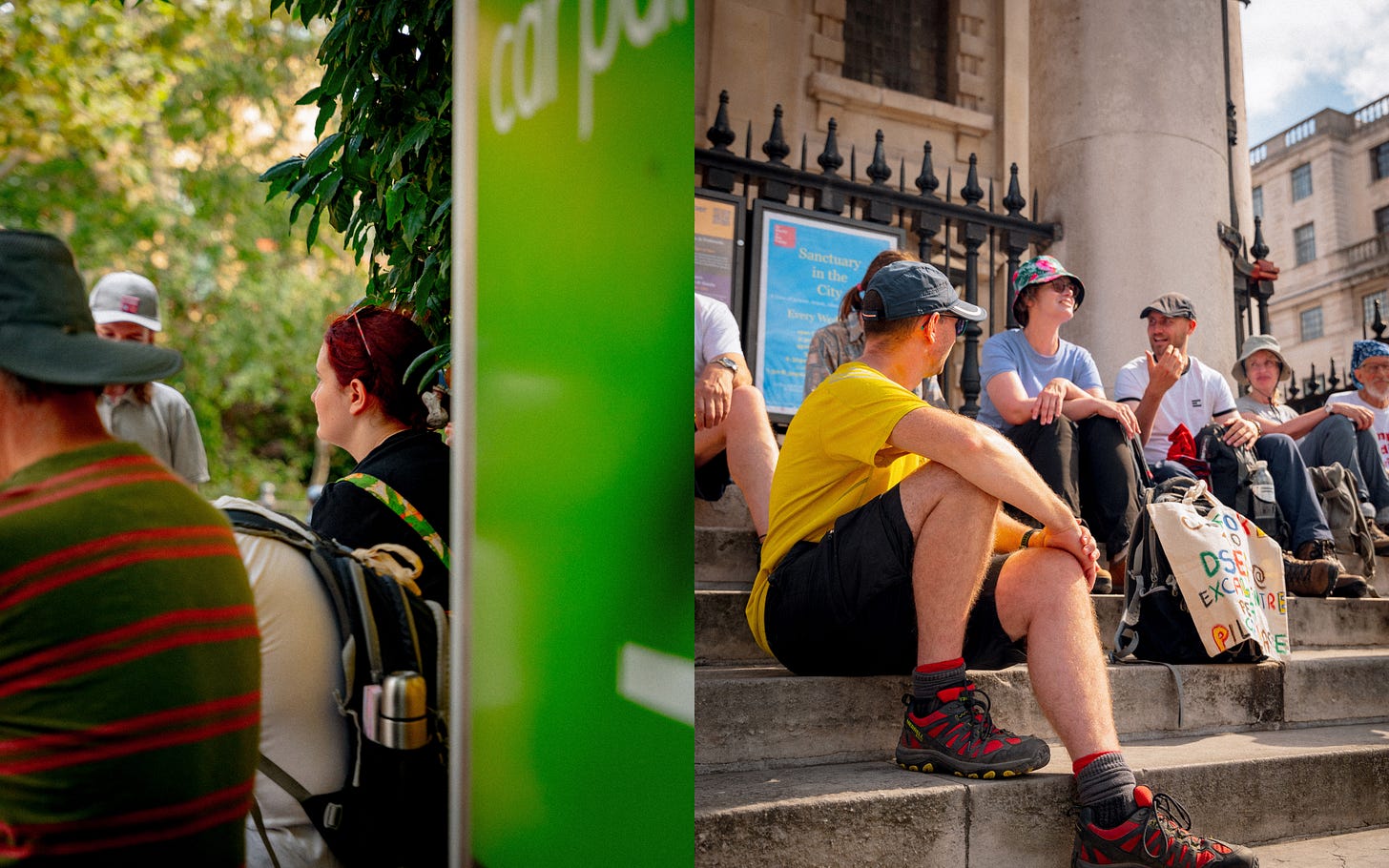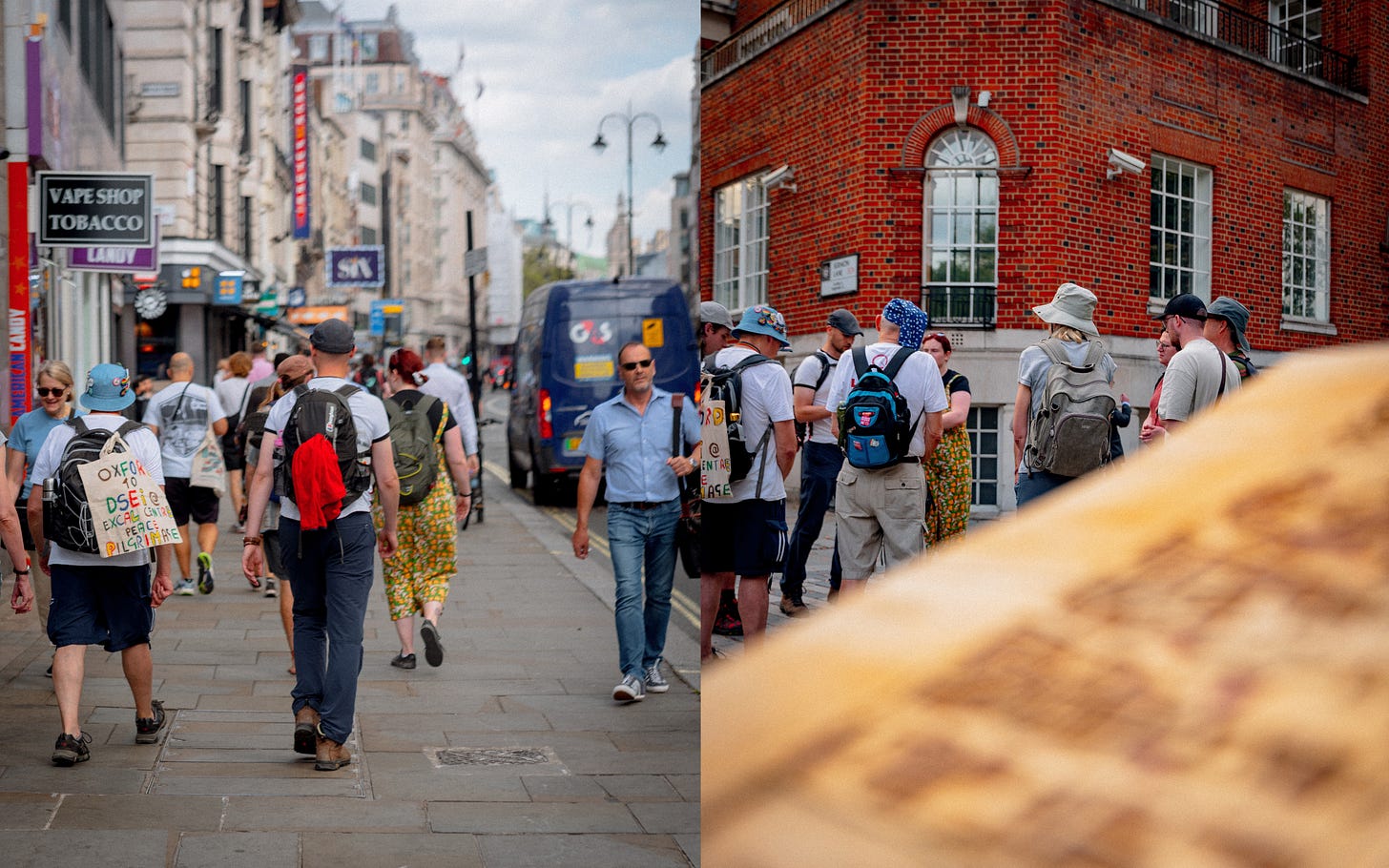Can the practice of pilgrimage sow seeds of peace in the world?
Participants in a Peace Pilgrimage choose to walk, often for several days, to the DSEi Arms Fair — in protest, and reflection, on the arms trade.
This article originally appeared in Passio Magazine Issue 12 — our paper copies are sold out, but you can pick up a PDF edition here (or newer Issues in print).

Can the ancient practice of pilgrimage help us to sow seeds of peace in the world?
In 2023, and in pursuit of that question, a group of wanderers set out from Oxford, arriving in London six days later in time to join a candlelit vigil outside the DSEi Arms Fair.
Some joined the pilgrimage for a day, some longer; some walked the whole six days. On the final day, as the group drew near the Arms Fair, they also paused for times of silence outside the head offices of a number of UK arms manufacturers. The following reflections are drawn from the Peace Pilgrimage Podcast—a 10-part series that was recorded en route—to explain in people’s own words why they felt drawn to make this journey.
Matthew Neville, event organiser
Why am I doing this? Why am I becoming a pilgrim? I think the first thing I would say is that the arms trade is a great evil, which underpins a lot of the destruction in our world.
By that, we could be talking about economic destruction, which leads to environmental destruction; we could also be talking about the destruction of people, particularly in the Global South—in other words, the people that make all the things that we consume, or over-consume.
The arms trade is what protects all of that. It is the ‘elite’ part of the world which over-consumes, and which is ultimately responsible for these forces of destruction we see. The elite—which I’m part of, by the way, and which many of us are part of—can only do that to the world because we’ve got weapons. Because we’ve got this force which allows us to do it. That underpins everything else.
When discussing this with people, we inevitably come up against questions about Ukraine and the like: how would you deal with Russia, with China, with whichever aggressor state is opposing us. I’m not saying those questions aren’t relevant. But for me there’s something much deeper at play. The weapons we manufacture don’t exist for those cases; they exist, primarily, to protect our privilege. I think that’s wrong.
Hand in hand with that is an acknowledgement that I, albeit in an indirect way, benefit from the arms trade. I benefit from being in a very privileged country.
So going on pilgrimage entails a certain amount of simplification, living on the road. And my hope is that it will involve some level of reflecting on that privilege. I’m hesitant to say atoning; I don’t think a walk like this atones for anything, not in a real way.
But there’s a ‘struggling with’, so to speak. A struggling with the reality of structural sin, and how my privilege, my position as a citizen of a Western society interacts with the fundamentals of what keeps that society going. That’s an intellectual task, but it’s also a spiritual task, with the possibility of deep change.
Lastly, another aspect of the pilgrimage is taking the space to ponder how the world could be. A vision that in my own mind is quite hazy, but perhaps in a greater mind—a divine mind—is clearer. What does a good life look like? What is the life that we should be living, and how do we get there? What are the spiritual disciplines, the mind practices, and above all the community practices we need to begin to embrace, to get us to that place?
Mark Keir
There’s an acceptance of violence and corruption in society as a whole. I think anybody who is going to stand up and say ‘we can’t accept this any more’ has to do it in a very gentle, peaceful way. So I can’t think of a better way to do it than in this pilgrimage.
This is also, I hope, going to be part of my journey towards understanding how peace can be a part of me and I can be a part of peace.
Sam Donaldson
There’s a longing in me to see a more peaceful world emerge. There’s part of me that wants to make some kind of stand in solidarity with those who suffer because of the arms fair, and shine a bit of a light on what’s going on at DSEI arms fair—all the devastation that’s caused by the sale of arms, and the greed and corruption that happens as a part of that trade.
I’m also here as a bit of an adventure; there’s a sense of the unknown ahead of me; I’m sure I’m going to discover some things about myself, and meet new people along the way, as well as seeing new places.
Jim Strickland
I am a Deacon at a Metropolitan community church in North London; an all-inclusive, social justice-led, queer church. I actually served 16 years in the Royal Navy; and then spent 16 years as a nurse in the NHS.
I’m walking for solidarity, walking for peace, walking to make it known that there are people who care about peace; there are people who want to bring the realm of God from the distance into the here and now. I want it to be known that people—that I—care about the dignity, the quality of all humanity. I’m walking because I believe that people should be able to live in peace, with full equal rights, in any place in this world.
Join the Pilgrimage
Peace Pilgrimage is at it again: you can join this year’s pilgrimage from Oxford to the Excel Centre between Monday 1st and Monday 8th September. Walking for peace, in protest against the DSEi arms fair, and against our government's complicity in the arms trade.







